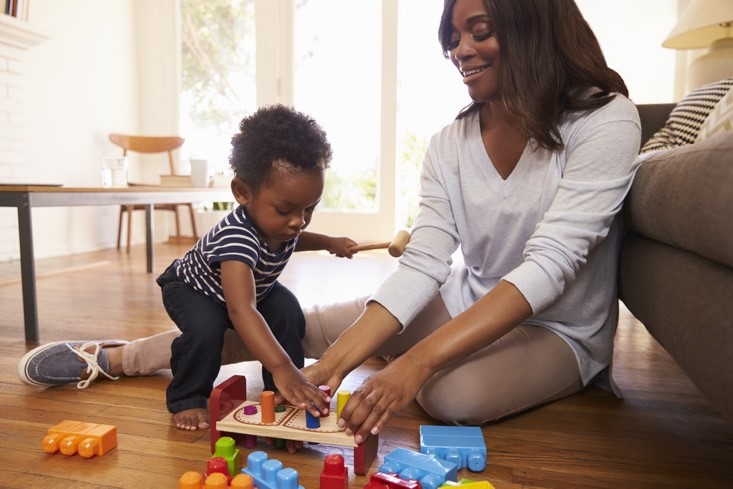Maximize life’s most important teaching tool by playing with your young child
Spending time playing with your baby or toddler is not only a fun opportunity to engage and connect with one another but it’s also a great teaching tool. The simple interactions exchanged during playtime encourage young children to learn and explore the world around them, which is crucial to early childhood development.
Playing inspires imagination, creativity, critical thinking, and problem-solving while teaching cause and effect and social skills. Playtime is good practice for sharing, taking turns, working on motor skills, and cooperating with others, too – it’s more than just fun.
You are the first and most important playmate your child has in their early years. You’re also their most trusted relationship, which encourages them to try new things in a safe environment.
Help your child benefit from the power of play by making it more productive with the following tips and tricks.
1. Let their interests inspire you
Encourage open, unstructured play by giving your baby or toddler the freedom to play with objects however they’d like (as long as it’s safe, of course). Children play in unique ways and with a wide variety of objects, often expanding on their intended uses.
A pot from the kitchen can become a drum, a table, or a hat, and a sheet may serve as a cape, a fort, or a picnic blanket for pretend food. Don’t set parameters around an object’s purpose; encourage your child’s creativity. If they show an interest in something, follow their lead and suggest related activities.
2. Practice independence
Babies and toddlers need the time, space, and support to try new things without help. It’s an important part of learning new skills. Don’t rush in the second you see your child struggling to achieve something – stand back and watch before offering gentle verbal cues.
Whether it’s drawing a shape or stacking a block, show your child how something is done before letting them practice trying it on their own. Working to master a new skill teaches them not to give up and helps build confidence.
3. Embrace repetition
Young children have a habit of wanting to do things again and again. Although it grows tiresome as a parent, it’s an important part of the learning process. Once a child can do something well, they enjoy repeating both the process and the sense of achievement that comes with learning a new skill.
Maintaining enthusiasm over your child’s repeated successes encourages them to try new things to experience new accomplishments.
4. Evaluate your environment
A child’s play area should be safe, stimulating, and organized in a way that allows them to focus. If your child is easily distracted by loud noises, turn off the television and remove as much background sound as possible during playtime. If your child becomes overwhelmed, limit the number of toys out to just a few essential items that you can swap out occasionally.
Make sure there is plenty of room for exploration and the occasional unplanned event, such as a ball that is thrown instead of rolled. Baby-proofing is a crucial step to avoid accidents and allow some freedom.
5. Get involved
The best thing that you can give your baby or toddler is your time and attention. Show a genuine interest in their efforts. Get excited about their ideas and accomplishments. Ask questions and start a dialog – even if they don’t have the language skills to answer.
Initiate play such as rolling a car, rocking a babydoll, or making stuffed animals act silly. Being playful is good for your child, but it’s also important for you to maintain that feeling and ability as an adult. Create memories and opportunities to share laughter with your little one.
Playing with your child provides them with a nurturing environment to learn about themselves, the world, and their relationships with the people around them. Teach your child important life lessons like social skills, resilience, creativity, and problem-solving while you enjoy spending time playing together.
The Virginia Infant & Toddler Specialist Network helps improve the quality of care for infants and toddlers through extensive resources, services, and education for caregivers. Learn more about how we can help you improve the standard of care.




